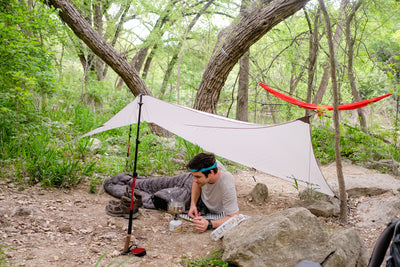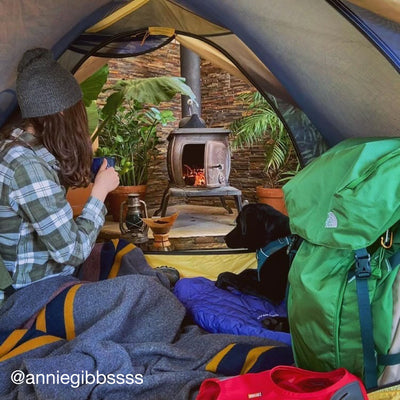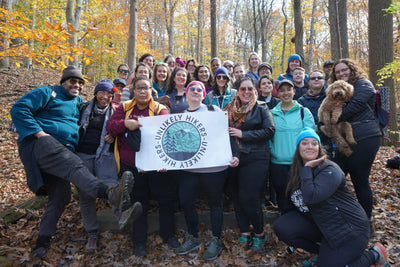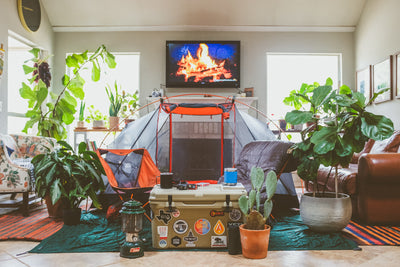Super Camper Feature: Wes Hetricks
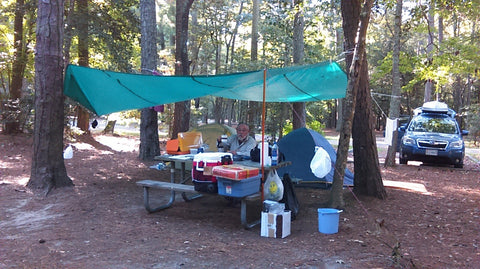
Both my grandparents are farmers in the rural countryside of Taiwan. When I was younger, my grandpa would take me and my sister out on his one-seater motorcycle to see his fields. We’d visit his pig farm, play with farm dogs, and pick bamboo to eat for dinner that night. Despite our language barrier, my grandpa shared his knowledge of the outside world by directing our attention to hidden gems in nature.
Grandparents are human libraries - filled with stories acquired over the years. For National Grandparents Day, we sought out our second Super Camper, Wes Hetricks, to impart upon us his own wisdom from more than 70 years of experience outdoors. Wes Hetricks is almost 80 years old and has been an active Birder since the age of 6. He grew up in Pennsylvania where his grandparents taught him to rabbit hunt and fish. Back in the day, Wes worked as a software engineer, but now he spends his most of his time with his granddaughter outdoors.
Read on to learn what Wes Hetrick has discovered over his years outside.

The outdoor scene is growing and changing quickly - what are the biggest differences you've seen over the years?
The magnitude of the interest. When I was growing up and having conversations with friends, we didn't even have the word “Birder”; it was “Bird Watcher”. The fact that I was a Bird Watcher made me an oddity. If you were interested in the outdoors, you had to be in skiing, or some other athletic event. The idea of being interested in nature itself such as, birds or trees, was weird. Whereas today that is completely reversed. There are millions of people today who are not ashamed to be Birder, and the number of active state and international organizations supporting naturalists in a legal manner have grown. That’s brand new… 50 years ago there was little interest in birds or in the environment. The whole idea of people studying the environment and being “environmentalists” wasn’t really heard of. You’re part of a different world today. We are much more aware of our impact on the natural world, and how much we have to work to save what’s left.
What are some valuable life skills you’ve learned from the outdoors that technology couldn’t teach?
The idea of being an observer. When I was a young man I went on a road trip with a friend of mine that was an architect student. He was interested in gables and had a polaroid. As we travelled, he took pictures of roofs. It taught me a lesson. He got a lot more out of the trip because he was interested in something and had a focus to observe. Driving into towns, he wasn’t just aware of the traffic and the pedestrians, but also he was looking at the roofs of houses. You have to have a very specialized interest to take pictures of gables, and he did. So I thought to myself, “I’m interested in birds, I just need to be more attentive and more searching.”
When most of us go camping, hiking, or a weekend outing, we are caught up in the preparations and the planning. However, I have to keep reminding myself that I have an interest outside of just the hike and the preparation for the camping trip. I’m interested in what’s going on around me. It’s the trick of having purpose. When most of us go and face the outdoors, it’s so unusual and stimulating to our sense, so we forget that we are there to observe and learn.

What are things you teach your granddaughter about the outdoors, and what has she taught you?
She’s taught me the most through asking questions. She asks questions and sometimes it’s a challenge to answer a young person’s questions. I’ve tried to expose her to not just the names of birds, but also to be able to identify a bird by sounds. Most of us that have been birding all our lives recognize that we first hear a bird before we ever see it. When you’re out in the field there are sounds all around you; it’s overwhelming. I’ve taught her to focus her attention and identify sounds, which is a basic skill of birding.
When you step outdoor at dawn, wherever you live, you hear something. What is it? Can you identify it? The trick is to be aware of what’s around you. It’s a difficult lesson because we are constantly surrounded by sounds. To be able to slow down and listen is also an important health idea, because it focuses your energy. Especially for elderly folks my age, they have a lot of worries and concerns, so they find it difficult to relax. I go out for a walk every morning to listen and keep track of what I see. It’s a soothing way to start my day.

As you grow older, how have you adjusted your experience in the outdoors?
As you get older, you slow down. To face the outdoors becomes a lot more challenging, so you have to budget that energy. I realize I can’t do as much as before. I use to be able to walk 8-10 miles. Dawn to dark, I was active and able to be out in the fields. That doesn’t happen much anymore. The kind of birding that I do isn’t as aggressive. I use to chase and travel a lot just to see a rare bird. Today as an elder, I spend more time doing casual things rather than energetic things. Age teaches you to scale your goals.
What is some advice or encouragement you’d give to someone that feels restricted by their older age to go outdoors?
I know many people my age that are couch potatoes, and maybe it’s through failing eyesight, hearing, or other infermaties. They’re discourage from getting out at all. The one thing that I’ve learned after I recently got out of a major surgery is that I can do a lot just by getting out. Even if it’s for an hour. If it’s not raining, I recommend going out close to dawn and appreciating the nature around you.
I certainly don’t live in a wild area. I live in the middle of commuting traffic, so it’s hard sometimes to hear the birds over the populated area. However, I’m able to get out in the morning, exercise my sense, and realize there’s a natural world around me. Many people my age kind of give up and turn their lives over to television, and they don’t really get out to enjoy what’s in their neighborhood. Usually within a 100 yards wherever you are, you can find something interesting. People my age are afraid to go out. They don’t have a motivation to leave. They don’t say it in those words, but they don’t have an interest. I’m lucky that I do have an interest.
Lastly, grandchildren are a huge incentive to go out. Having a younger generation ask you questions and being present is a motivational force to go and explore.

Wes embodies our core value of love by sharing the joy of the outdoors with his granddaughter. From helping her with math to teaching her the tricks of birdwatching, we are inspired by the way Wes takes time out of his day to selflessly invest in the younger generation, and we are grateful for his time shared with us.
Know someone who embodies qualities of a Super Camper? Send an email nomination to marketing@kammok.com.
Words by: Rebecca Chen
